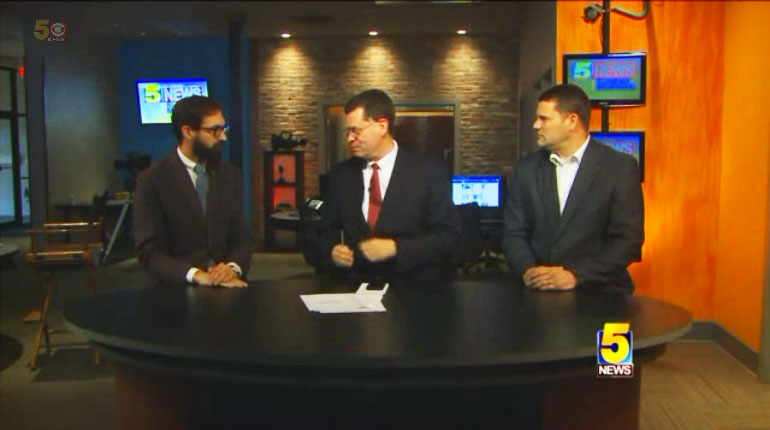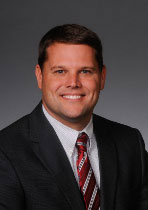
(From left) Fayetteville Alderman Matthew Petty, 5NEWS managing editor Larry Henry, and Sen. Bart Hester, R-Cave Springs.
Two political leaders participated in a brief debate and discussion of the facts about Fayetteville’s civil rights ordinance in a “5NEWS This Morning” segment which aired Sunday on KFSM.
During the segment, 5NEWS managing editor Larry Henry talked with Fayetteville Alderman Matthew Petty and state Sen. Bart Hester, R-Cave Springs.
Voters are set to decide the fate of the Civil Rights Administration ordinance which prohibits business owners and landlords from unjustly firing or evicting someone for being gay or any of several other characteristics.
The ordinance was passed by the Fayetteville City Council on Aug. 20, but the group Repeal 119 turned in enough signatures to put the new law on hold and force a Dec. 9 special election.
Read a transcript of the debate below or watch the video at 5NEWSOnline.com.
Intro
Larry Henry, 5NEWS managing editor: There’s a big election on Tuesday over Ordinance 119, whether it should be rejected and repealed or maintained. I’ve got two guests with me today who have been active in that issue and that debate – Alderman Matthew Petty of the Fayetteville City Council, the architect of 119. Thanks for being here.
Alderman Matthew Petty, Fayetteville: Thank you for having me, Larry.
Larry Henry: And Senator Bart Hester from Cave Springs, who has also taken an active role in the issue in bringing up some points. Let me start with you, Senator. What’s wrong with Ordinance 119? There’s also been some talk about people from outside being involved, including yourself. What’s wrong with the ordinance and what’s wrong with people getting involved who aren’t Fayetteville residents?
Churches and same-sex marriages
Sen. Bart Hester, R-Cave Springs: Well sure, thank you for having me today, Larry. I think what’s important about this is we have to understand that we live in the United States of America, and we’re all Americans. And in America, we have the absolute right of freedom of religion. And 119, it takes that away and prohibits that from many of our pastors and people of Fayetteville.
Larry Henry: Now how does it inhibit religion?
Bart Hester: It says that a pastor would have to perform marriages for people that he doesn’t believe – that are outside of his religion.
Larry Henry: You mean same-sex marriages.
Matthew Petty: That’s not true.
Bart Hester: That is true.
Matthew Petty: I respect the senator, but that’s absolutely not true. If you look at the opinions issued by our city attorney, which have been very clear on the matter, in no way would this ordinance ever require any pastor to issue same-sex marriages. In fact, there’s a general religious exemption. Anyone who claims that they need to violate the ordinance on the basis of religion is exempted from any penalties whatsoever. There are those who claim that our city attorney’s opinions don’t carry any weight in court, but if you look at the Arkansas Supreme Court, and they’ve said on at least two separate occasions, that the interpreter’s opinion should be given great deference by the court, and they’ve called that a familiar rule of statutory construction.
Bart Hester: I think what’s important to know about that, is that bill does not say anything about protection. It’s one person’s opinion. And that person could be different next week or next year. And also in his opinion, he said it protected within the sanctuary, so if that priest goes out and does a religious ceremony in the park, he would have to do any religious ceremony in the park. And that’s un-American.
Matthew Petty: That’s not true as well, actually.
Bart Hester: It is true.
Matthew Petty: I respect you, again, but there are two paragraphs in the ordinance that are explicit about this. One says any activity taking place on any tax-exempt property is exempt from the ordinance. And it also says – the other paragraph – anyone can claim a religious exemption from the ordinance, period.
Bart Hester: So you talked about tax-exempt properties, so if they wanted to rent a property at a business in Fayetteville, that pastor would have to then perform a same-sex marriage?
Matthew Petty: No. Again, because of the other paragraph, there is a general exemption for any religious claim.
The bathroom debate
Larry Henry: Let me raise another issue real quickly that’s been sort of a hot-button issue in Ordinance 119 – again, the election is Tuesday and early voting ends Monday – that is whether a transgender people can use the restroom of their choice. What’s your thought about that, Senator? And then Alderman Petty, I want to have you respond.
Bart Hester: Well I think it’s very simple. We should never put the choice of an adult over the protection of a child. This gives an adult man – 30, 40, 50 years old – the right to share a bathroom with a six-year-old little girl, the right to share the changing room with women at the local gym. It’s not right. We need to protect our children. This is the United States of America. We put our children above the choices of adults.
Matthew Petty: I think people who spend their lives as women should be able to use a woman’s restroom or a woman’s changing room, and somebody who spends their life as a man should be able to use a man’s changing room or a man’s restroom. What’s at issue here is, well there’s some confusion about this because there’s been a claim by Michelle Duggar and by others that these transgender folks are perpetuating predatory behavior and that couldn’t be further from the truth. If you just look at the statistics, transgender people are the victims of murder and rape at the rate of about ten times that of the general population. They are the victims. When you look at the ordinance that has been passed, very similar ordinances with protections for transgender people in over 200 other cities and by 95 percent of Fortune 500 companies out there, you have not seen this kind of claim manifest.
Help from the Human Rights Campaign
Bart Hester: It think what’s interesting about this is that Alderman Petty got this ordinance from a Washington D.C. firm called the Human Rights Coalition [sic]. And the founder of the Human Rights Coalition is currently facing charges for sodomizing and raping a 15-year-old boy. That’s the foundation of this bill, it is not American, and we won’t stand for it in Arkansas.
Matthew Petty: That’s not true, either. I’ve never met – what was his name?
Larry Henry: Terry Bean?
Matthew Petty: Yes, Terry Bean. I’ve never met him and had never even heard of him until this was brought up by the opposition last week.
Bart Hester: He’s the founder of the people that wrote your bill.
Matthew Petty: They didn’t write the bill, first off. All they did was provide a couple of copies of ordinances from other cities that had passed similar things. We wrote the bill at the city attorney’s office. It took us four weeks to do it, and by the way, I’ve been considering this since 2009 and that’s going on six years ago. So this has been a long time in the making. This is a local bill from local people. We’ve had $37,000 worth of donations from Arkansans – most of those from Fayetteville – and the same goes with volunteer hours. This is a local campaign that was started by locals, and it’s going to be finished by locals. And that’s the end of the story on that I think.
Burden of proof debate
Bart Hester: I think it’s going to go right back to where I started. We’re the United States of America. People in Fayetteville understand what it means to be an American and to protect our rights of freedom of religion, to protect our children, and to protect I think something very important about this – when you are accused the burden of proof is on the accused not the accuser. That is totally un-American, and I don’t think the people of Fayetteville, and I know the people of Arkansas won’t stand for it.
Matthew Petty: That last claim is just completely made up, Larry, I have to say. This is a standard judicial proceeding that requires the finding of probable cause, and it requires proof beyond reasonable doubt before any punishment could ever be carried.
Larry Henry: I really appreciate you guys being here today. We’ve been with Fayetteville Alderman Matthew Petty, the architect of Ordinance 119 – the vote is on Tuesday, early voting ends Monday – and state Senator Bart Hester from Cave Springs. Thank you guys for being here.
Bart Hester: Thank you.
Matthew Petty: Thank you, Larry.
Early voting is available at the county clerk’s office on the third floor of the Washington County Courthouse between 8 a.m. and 4:30 p.m. through Monday, Dec. 8.
Election day polls will be open from 7:30 a.m. to 7:30 p.m. on Tuesday, Dec. 9. Polling site information is available at www.voterview.org.
For more on the special election, see our guide to Understanding the Dec. 9 civil rights special election.



